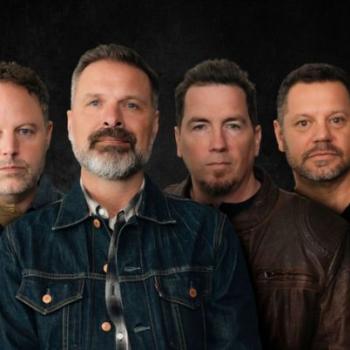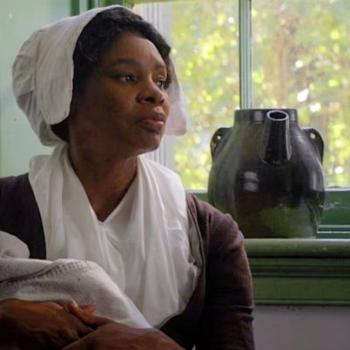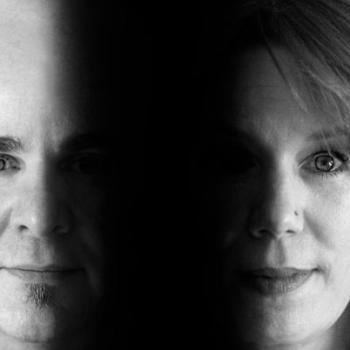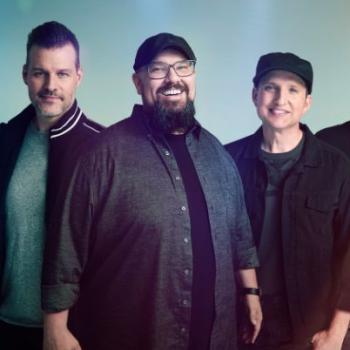As the drummer and a songwriter of the hit band Hootie and the Blowfish, Jim (Soni) Sonefeld rocketed to superstardom in the 90s with hits such as “Hold My Hand,” Only Wanna Be with You,” and “Let Her Cry.” As the band continued to grow in popularity, Soni began to wrestle with addictions and all of the trapping of a rock and roll lifestyle. As his world began to crash, he checked into rehab where he returned to the Christian faith he held as a child.
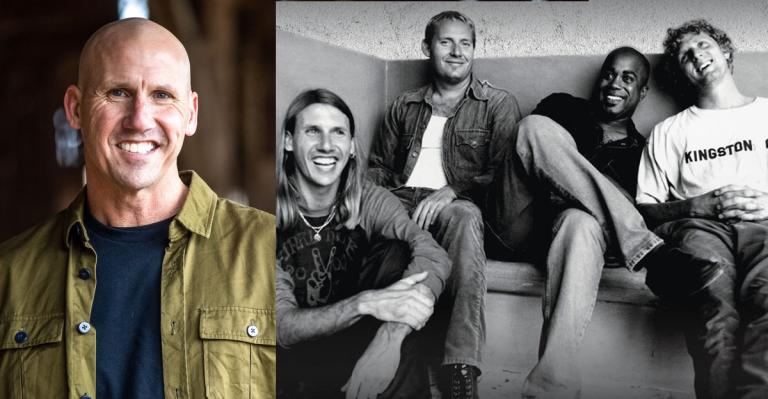
Recently, Soni released his newest Christian music recording, a six-song EP named “Remember Tomorrow,” including the songs “Bow to Him,” “Jesus,” and “A Little Revival” following an earlier release of the autobiography “Swimming with the Blowfish: Hootie, Healing, and One Hell of a Ride.” In this exclusive interview, he gives an eyewitness account of the band’s ascension to the national stage, his life’s turnaround, and his faith in Jesus.
So Hootie and the Blowfish started as a college band, right?
Yes, we were all eager to become songwriters and performers outside of the university sort of cocoon that we were in at the time, in the late 80s. And we’d sort of started writing songs. I was in a different band when Hootie started, that was on campus as well. But by the time the end of 1989, I was joining Hootie, because we all really wanted to concentrate on the songwriting aspect and persevering to travel. What you had to do in the late 80s, was drive around with your cassette tape of original music and play shows for people and ask them to pay five bucks to buy them. There was no other way to get a fan base. So, in 89, we all sort of made a concerted effort to direct ourselves that way, without much going for us—we weren’t fancy, we weren’t well taught as far as music and songwriting. We were very green and had a lot of perseverance.
Then you guys broke out big in the 90s with some of the biggest hits of the decade, like “Hold My Hand” and “Let Her Cry.”
We played clubs and drove around trying to get a record deal from you know, 89 to 94. It was really we got in the studio to make “Cracked Rear View,” which would become our Atlantic Records breakout. That put us on the map. That happened in 94. So, after 94 through the early 2000s, we were pretty much moving fast, traveling the world and trying to stay on top, which is a whole game altogether, not nearly as fun as getting to the top.
The one thing I appreciate about that music is that it came out at a time when things were kind of angsty, and mellow. And Hootie was pretty upbeat, even in the middle of whatever was going on in the landscape. It was kind of like a bright spot.
That’s part of the key to us breaking through to the surface was that we, to some degree went against the grain of what was wildly popular at the time, which was the grunge scene. We listen to a lot of that type of music. You know, I had no problem with that style, the angsty sort of pain-driven music. If anything, I was just jealous that they’re on MTV, and we couldn’t even get a record deal or on the radio. But I think the truth is that certain cycles of music last certain periods and we sort of had to be the torch carrier, as grunge was not fading away, or maybe people were just looking for something new. The same thing happened to us years later, when people were again, looking for something new to get away from the upbeat, happy, joyous acoustic rock bands. And that’s what music does, it keeps turning and sort of recycling itself.
At this point in your life, you had a turnaround. You came to know the Lord and started doing music on the side or music that expressed your faith.
By the early 2000s, I became aware that my drinking was a concern to others. I wasn’t much concerned with it. I spent probably three or four years trying to hide it or downplay it in some way. That didn’t work too well. I’d started a family and was married, and we were traveling a lot as a band. I continued to either get in trouble or cause people anxiety where I was hanging out and the kind of hours I was keeping. And it’s a stressful life for not only the person that is the addicted one but those around them. It’s a sickness. So, by the end of 2004, I sort of came to the conclusion that I was sick and tired of that lifestyle. I just didn’t know which way to turn. So I made a turn towards first, getting rid of drugs and alcohol. And I ended up hanging out with groups of people who were staying sober. And they were using a 12-step model to do so. It changed my course. Because I needed a change. I was looking for something. I just didn’t know what it was. And that sort of spiritual step work led me back to something I had pushed off as a kid called my Christianity. I stayed on course, for the most part, I passed school, I was an athlete. But you know, really, in my mind, if I’m honest, I was trying to get away with stuff at every turn and ended up trying to balance these two lives where one was him who looked like he was a good kid from a good family and was successful and thriving. And the other was this one who was getting away with stuff, hiding stuff, having secrets, and living a darker lifestyle. So, after 25 years of that, I was just like “Please, somebody help me.” And so my path continued to unfold and as I got back into the Bible and try to put this spiritual life into action, not just a belief system, but really trying to enact it in my life, it ended up changing the way I wanted to write music and what my musical content would be. Probably by 2009 or 2010, I was already realizing I didn’t want to write about pain and suffering so much anymore. I wanted to celebrate the glorious spiritual revival that I was having in my heart.
Wonderful. And you’ve been doing that since the mid-2010s. Is that right?
I think my first really contemporary Christian release was in 2012. And I put out a record in 2008, there was a full-length album, too, that I called the “Coming Out of the Fire” album where I was seeking, I was ready. And it’s under the name James Sonefeld, my real name. It’s a little harder to find, but it is on Spotify. And that’s a good album, too. For those who are not sure which way they’re turning, it indicates a little more of the pain and suffering and the questions and the doubt. And by 2012, I was living more in celebration of I called having been found. The music from there on out is committed to positivity, to the idea that love as an action is what we need and what I need. I’ve been writing that style.
Let’s talk about the new record. I know the first single is “Bow to Him” and other songs like “Jesus.”
“Bow to Him” was the first song we put out. And it’s an obvious shout-out to God to say “This is where I want to be, this is the answer.” And this unconditional love that Jesus preached is what makes my life better, even on top of times where I don’t want to admit it, or I’m selfishly seeking, it really is the true essence of peace for me. I wanted to acknowledge that. We put out a second signal called “Good to Get Back,” which is just more of a throwback to realizing something behind you something maybe in your childhood or growing up, transformational period is good to get back. It’s good to see it and realize, “Wow, I’m the sum of a lot of things. I’m not just what I am today. And I’m a lot of stair steps along the way that got me here.” And then our third song that will be coming out soon is going to be called “I See Heaven on Earth,” which is an acknowledgment that there does seem to be a lot of strife and argument and war in our world. I’d really like to try and focus more on the peaceful heavenly aspect, which I think is available to I see heaven on earth is talking about, Iyou turn on the news for eight minutes, you’re going to think the world is coming to an end today. Really, while that might be the way that some people like to look at things, it’s not the way I want to look at things. I would like to remember and share that there’s a lot of beauty and love going on in this world. And it’s up to me to not only bring it but to be nourished by it. I don’t I don’t like the negativity. I’m not trying to dodge reality and act like there’s no bad things or that there’s no unfairness, but “I See Heaven on Earth” is a reminder and a calling to say this is what I’m choosing to take part in not the pain and suffering.
How did your sobriety and coming to faith affect those around you? Like your family or your friends or whatever? What kind of response did you get?
I’d like to think for the most part my turn into sobriety and higher spiritual calling benefited everyone around me. Even for my band who was highly supportive of me, getting my life together, it also means they’re dealing with a changed person. And as I did continue to change, it was hard to be the old Hootie family. We like to hang out together, we like to party together, we like to travel the world together, it’s been a brilliant fellowship. But when I sort of had to hop off that train, because I can’t drink like other people, I can’t handle chemicals, like a normal body. And but I think the healthier or more honest, Jim if you will allow me to use myself in the third person, is a better man. If anything, more honest, I’m not claiming to be on any certain level, but I am willing to be more honest with myself. And that allows me to be more honest with others. And that’s sort of the core of the change I made. I didn’t know who I was, I was trying to live into something, wearing a mask, and trying to make you believe I was something but really, I was a lot of other things that weren’t so pretty. And when I came to acknowledge that, within myself, I became a little more willing to share that with others. It’s also the core of my part of my music message is not just praising Jesus, praising a higher power, but saying, “I’m broken. I’m not claiming to be above anyone. I’m down here. I have real difficulties. I have real shortcomings. And the more I acknowledge them and get them out of the darkness, I think people can see them and maybe not be afraid of their own difficulties and acknowledge them.”
It seems like you still have good relationships with everybody because I saw that Darius Rucker wrote the foreword to your book.
I pinned him down and told him he needed to say something nice about me. And he obliged. You know, we have remained good friends. During the period of dormancy, which lasted really from 2009 to 2019, where we have decided as a band, we’re going to pull back, we’re going to stop the incessant touring. We’re not going to write together for a while. And it was at that time that Darius, his first country record came out. So, it coincided with him having success and wanting to put some time into it. During that period, we still did three or four shows a year for our Hootie and the Blowfish Foundation, which was very meaningful to us. We have a foundation that benefits a lot of charities down here in South Carolina. And we weren’t going to give that up because that was just too important. So, we got to see each other even through the dormant years as our kids were growing, as everyone was sort of starting new families, we got to still be part of each other’s lives, including being part of Darius’ unbelievable success in a new genre, country music. It was nice to be able to celebrate his success. It was nice to be able to as a human, who traveled for many years to stay home doing what I felt was a better, more authentic thing for me, which was being a better husband, a better father. And that’s what allowed me time to write my spiritual music anyway. I can do that from my piano downstairs. I can record it with friends. And I can put it out on our lovely Internet where music is really you know, infinite.
And you also put your story in book form?
I want to try and share the story of where I came from, the joy and the difficulty of being in a band that was touring the world. And then what can happen as a result? I got caught up in a bad lifestyle and a sickness that I couldn’t really control. And in the end, it’s a very nice story, I think, because we got the 2019 reunion tour, which proved that our success in the 90s wasn’t a mirage, it really did happen. Because as you look back and get further away from a big success, that was rather short-lived, you start wondering, “Wow, did that really happen When we got to tour amphitheaters across America in 2019 and see numbers, like 20,000 people a night coming out to see us, it helped me sort of breathe a sigh of relief that “Okay, there are, it really did happen, people really did this music is meaningful to them.” The book ends up sort of ending in that bright spot of families that have survived families that have been rebuilt or reconciled—the Hootie family, our personal families, and the family of fans that we have as well. It was a wonderful, just experience to go out and see how we connected as humans through music on that tour. And I want people to be able to see what it was like from the perspective of the stage and behind the scenes.
Do you have a moment during your career when everything took off where you just thought it was like such a, an amazing opportunity that you’ve thought “Am I really here?”
Sitting on the stage at the Ed Sullivan Theater, which is where “Late Night with David Letterman” was taped. We were there in the fall of 1994 in the same spot where the Beatles sat during their big performance in America in the year I was born, in 1964. Sitting there just shivering with anticipation and fear. I was in the band for five years, and we were playing our song, “Hold My Hand,” a song we played for years. I knew it, I could play it in my sleep. And I was frozen in fear as the red blinking lights were coming in front of my face. And that moment was a moment where I said, “Oh my gosh, this is I’m on television singing this little song that I wrote in 1989.” This was just a moment in time. Three and a half minutes on television. But we were beaming into millions of viewers’ living rooms at the time, and that would change our trajectory. As beautiful as that was, that’s not the only moment where I sat in awe and wonder, because if I fast forward to November of 2004, I sat in an equally amazing situation, yet it was filled with desperation. It was my last day of coming to grips with a very emotional and spiritual moment that I’m not in control of my life. My daughter, who was four at the time, found me sort of passed out in my music studio and wondering, “Dad, what are you doing here?” She walked away a little confused and I knew what I was doing there. I was lost, hung over of living a horrible lifestyle, and had lost control. I was sort of left there with the idea “What am I doing here? Where have any of my morals gone? Where has my ability to control anything gone?” Those are two moments in the book that are set apart. I mean, the lifestyle and successful music and music making, and careers is not always just the top. It’s the bottom two. I want to express that those were equally meaningful because they’re life-changing in very different ways.
Jim Sonefeld’s new EP, “Remember Tomorrow” is available here. His book “Swimming with the Blowfish: Hootie, Healing, and One Hell of a Ride” is available here.




